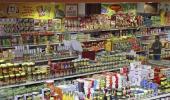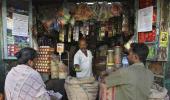'Due to rural stress, volumes continue to remain an issue for the industry, and we are yet to see any revival in demand.'

The bustling market of Ghoti, located roughly 140 km from Mumbai, presents a misleading picture. Amid the usual rush of pedestrians and hawkers selling everything, from clothes to toys, a closer inspection reveals the reality -- few are stopping to make purchases.
Ramanlal Nemichand Picha, a prominent general store established in 1965, wears a desolate look. Post-Covid, the store witnessed a sharp decline in customers, and the situation has worsened after Diwali.
Prem Picha, 23, the fourth-generation owner of the store, says demand across products, from shampoos to biscuits, has plunged.
"Our purchases from distributors for biscuits have dropped by 15 to 20 per cent," he says, adding, "Demand for larger toothpaste packs has fallen by nearly 20 per cent since the pandemic." A lot of stock is close to its expiry date.
The story echoes at the nearby Gaikwad Provisions Stores. Swapnil Gaikwad, who manages the 1,500 square feet store, has shifted focus to supplying food and cosmetics to local restaurants, hotels, and resorts due to the near wipeout of retail demand.
Customers like Bhaskar Govind Bharve, a 55-year-old farmer who has come to shop for essentials, mirror the strain.
Reduced crop yield due to an erratic monsoon has forced Bharve to trim non-essential spending drastically.
Though he now visits the stores more frequently, he buys only essential items in smaller quantities. He leaves after purchasing a packet of biscuits and a litre of oil.
This slump isn't unique to Ghoti. Dindori, 70 km away, faces a similar plight.
Joginder Kumwat, a worker at Krishna Sagar stores, notes a 30 per cent dip in demand since Diwali, prompting the store owner to cut procurement visits from weekly to bi-monthly.
"People who used to buy two items now settle for one," Kumwat laments.
"Look, is it usual for a store to be empty at 6 pm?"
Shivaji Sampat, 65, who grew tomatoes on his one-acre farm, has made no profit this kharif season as prices fell. He has had to dip into his pension from the irrigation department where he earlier worked.
"Last year, I made a profit of Rs 50,000, but this year, I barely covered my expenses," he says.
This financial strain has rippled through to stores. At Varada Foods and General Stores in Igatpuri village, Rupesh Butada has seen a 30 per cent dip in income since the pandemic, exacerbated by an additional 10 per cent drop post-Diwali.
A customer walks into his store and asks for a Rs 5 biscuit packet. He has only Rs 10 packets. She leaves.
Fast-moving consumer goods (FMCG) giants like Hindustan Unilever and Britannia Industries are keeping a close eye on the stress in rural markets.
After announcing the company's September quarter results, Varun Berry, executive vice chairman and managing director of Britannia Industries, told investors: 'We are seeing a clear slowdown in rural [markets].'
There is hope, though, that the situation will turn for the better.
'These are macro issues, which companies like us cannot sort out,' Berry told investors.
'We continue to go on our agenda of building distribution because we know that while we've had a weak monsoon and the agriculture economy has not been the greatest this year, this will come back and when it comes back, we will benefit from that.'
After announcing its July-September results, HUL, the country's largest FMCG major, also pointed towards the continuous stress in rural consumption.
The management said HUL's rural volumes continued to remain under pressure in Q2 amid subdued rural demand.
At a recent Confederation of Indian Industry FMCG summit in Mumbai, various firms noted the disparity between the urban demand, which has continued to grow, and the pressure in the rural market.
'Due to rural stress, volumes continue to remain an issue for the industry, and we are yet to see any revival in demand,' Sudhir Sitapati, MD and CEO, Godrej Consumer Products, said.
Dabur India saw a better festive season, witnessing stronger demand from e-commerce channels and modern trade in urban India.
"While green shoots of recovery are visible, rural demand is still trailing urban markets," said Dabur India CEO Mohit Malhotra.
"We are still seeing liquidity issues in rural areas, despite the festival season kicking in."
Adani Wilmar expects rural demand to pick up only after the rabi harvest season in April.
"Household consumption in rural areas has been under pressure, but urban consumption has remained steady," said Angshu Mallick, MD and CEO, Adani Wilmar.
"Agri GDP growth contribution is low at 1.2 per cent as compared to an average of 3.5 per cent because incomes in these areas have been impacted."
Feature Presentation: Ashish Narsale/Rediff.com












 © 2025
© 2025